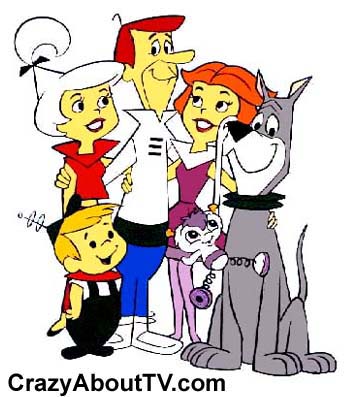Looking back at my life, I see a promise in entertainment and popular media that life is going to be vastly better in the future.

I don't specifically target The Jetsons - the Jetsons took place in 2062, we still have half a decade before the future of robot housemaids and flying cars fails to manifest according to schedule. But somehow the Jetsons seems to symbolize the failures of the world around us to live up to fiction.
Hey, it's the future folks! It's 2010 - "The Year We Make Contact." How much of the promise of technology in that film - let alone it's predecessor, now 9 years out of date - has failed to manifest? Well, you might as well say "all of it."
This is to say nothing of the many widely mocked 50s era "World of Tomorrow" type films where for as many near hits, there are as many or more ridiculous misses, all made the more amusing by the dated aesthetics.
The institutions of science have over the decades exacerbated the feeling of disappointment by over-selling the potential of the future, making implied promises that could not be lived up to.
I am being unfair to "science" here. As much as it was the towers of research that wrote cheques that reality could not honour, it was media that over-represented it, and the common man who all too eagerly believed what they were told. Perhaps scientists and their organizations hubristically failed to correct the perceptions, and in that they are culpable in the failures. But the point is that people - everyday people - got the wrong message, and they can't be held solely responsible.
I graduated from high-school in 1987. I fully expected that by now we would have been back to the moon - indeed, maybe I'd have the opportunity to live on the moon myself. As it is, the best I could possibly do is a six minute trip beyond the Karman Line, and that only if I can dig deep in the pockets to the tune of 200 grand. I figured that by now all cars would be electric, and computer controlled. We've only barely got to the point where electric cars are at all viable. I suppose skype has provided me with a video-phone, but boy is it cranky. But even when I move into my state of the art new apartment next week I'm not going to be able to tell the (literal) home computer to turn on the lights, start dinner, give me my messages and put on my favourite TV show.
I recall with great clarity the day in grade 9 physical education, when we were doing a sit down class on anatomy my teacher, Mr Foster, informed us with absolute authority that by the time we were forty (that's this past year) that "every organ in the body will be able to be replaced except maybe the brain." Perhaps his assurance was bouyed by the news - that was the year of Barney Clark. Obviously Mr. Foster was very wrong - and of course it was silly to expect a high-school gym-teacher to be any real sort of authority on such a subject - but there was no way I was going to grok that at age 13.
Similarly, I think it's safe to say that "we" expected that cancer would be cured by now; that a meal in a pill would be viable; and that we would have extended life expectancy by 20 years.
Science has failed to live up to these expectations. It doesn't matter if they were reasonable expectations or not. It hardly matters that science minded people everywhere know how unreasonable those expectations were, or the prevailing theories as to why and realities that have prevented us from making these achievements. What has happened instead is that the expectation - or more correctly the percieved failure to meet the expectation - creates in many people's minds another unrealistic perception: that science has failed us and that therefore it is full of shit.
Science medicine hasn't cured everything therefore how can it be trusted? This serves to help the anti-vax movement, as there is a visceral instinct to buy into the faulty logic that supports the notion that science has failed us. It plays into the hands of big pharma conspiracy - "why cure a disease when you can make more money selling the drugs that alleviate teh symptoms?" It feeds the beliefs of creationists and global warming deniers alike. It coddles the hostile attitude of anti-intellectuals and keeps them warm at night.
We as skeptics are the public advocates of science. It is our duty to foster a love of science and it's accomplishments. We are living in the future, and it is our job to take every opportunity to point our the victories of science - especially the mundane victories. We have Star Trek communicators; we have the ability to shop from the comfort of our couch; virtually anyone has the ability to write a regular column on anything that they feel they have an opinion about; we can access nearly any episode of any TV show we desire on little or no notice; we have taken the teeth out of AIDS and other deadly diseases; we can get directions from anywhere to anywhere while enroute. The list goes on and on.



Technology and marketing failed. We have the ability to do a lot of star trek (save transporters and warp drives), just most is too expensive to be feasible.
ReplyDeleteScience is as rockin' as ever.